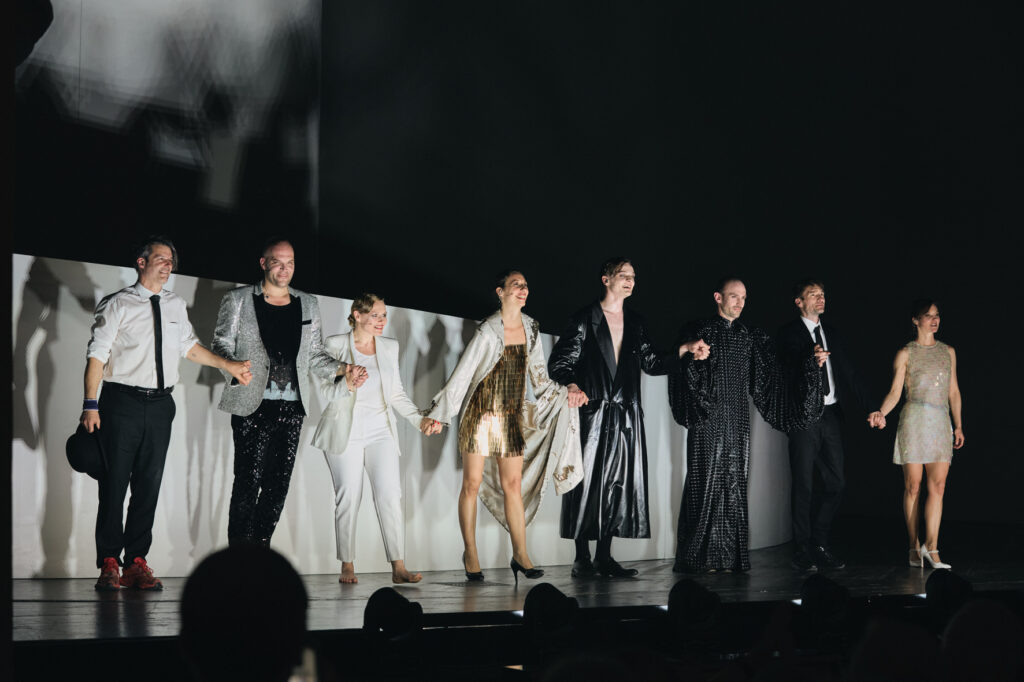–
The third play of the festival. Sebastian Hartmann stages Max Stirner’s „The Ego and Its Own“. The philosophical text from the 19th century provoked many in its time, just as Hartmann’s plays do today.
We see excerpts from Stirner’s text adapted into a musical, bathed in black and white aesthetics reminiscent of film noir. The evening is a show – a musical celebration of the individualistic – which spirals upwards like the snail-shaped tower in the centre of the stage, only to expose its fragility again and again. In a whimsical way, the monstrous behind the festivities emerges. Hartmann makes the audience laugh, even though they should hardly be in the mood for it. It feels like hiccups. And it is probably intended to.
This inner contradiction becomes clear, for example, when the ensemble – dressed in glittering entertainment costumes – performs a successful-unsuccessful choreography that smiles on the outside and whimpers on the inside. The disfigured, spasmodic movements of the unfortunates reveal the suffering that the compulsion of self-dramatisation seems to impose on the performers. One can be reminded of Willy Prager’s “Transformability”, in which the permanently jumping performers also display the absurd restlessness of efficiency-driven subjects. In Prager’s piece, the performers are trapped in biographical role models, and oscillate incessantly with tension, as a result of which all plans – such as drinking fancy drinks or passing on coins – fail thoroughly. The glamour moment of Hartmann’s equivalent conducts a similarly spectacular breaking-down, greying just as it wants to sparkle. „When I say I love the world, I say I don’t love it at the same time“, it states at one point.
Such distortions permeate the play. The degree to which the evil play is revealed beneath the good facial expressions varies, and sometimes even reaches Kafkaesque fever dreams. For example, the ensemble gushes over conversations that mime a wide variety of things, but verbally only repeat the word „maybe“, spoken in different nuances. A tragic-comic allegory of the feelings of the powerlessness of the neoliberal mankind of our time. The subject that is no longer certain of itself.
What does all this mean? With what motivation does a theatre-maker today pull Stirner’s text out of the closet, and serve it up to the audience as a „Bittersweet Symphony“? Interestingly, Stirner’s text always came to special attention in history when his critics published it, in order to “render harmless” his thinking by commenting on it accordingly. Thus, while Stirner’s ideology benefited from criticism of it, „The Ego and Its Own“ was at the same time the productive lever to generate its own refutation. According to today’s research, the critical processing of Stirner essentially inspired Karl Marx to develop his theory of Historical Materialism. That’s how dialectical the world is and we can possibly be grateful to Saint Max, as Marx and Engels cynically called Stirner. Is Hartmann’s play to be read as a twisted tribute to Max Stirner, which, dosed appropriately, is meant to evoke its own negative? Is the revival of the „one and only“ a cry for help to theory?
The final question would be what comes after the rejection of individualism. A liquidation of the autonomous individual by the masses forced into line has already painfully been registered in the history of humankind. For the sake of completeness, Hartmann should perhaps consider a sequel under the title „The Collective and Its Own“.
